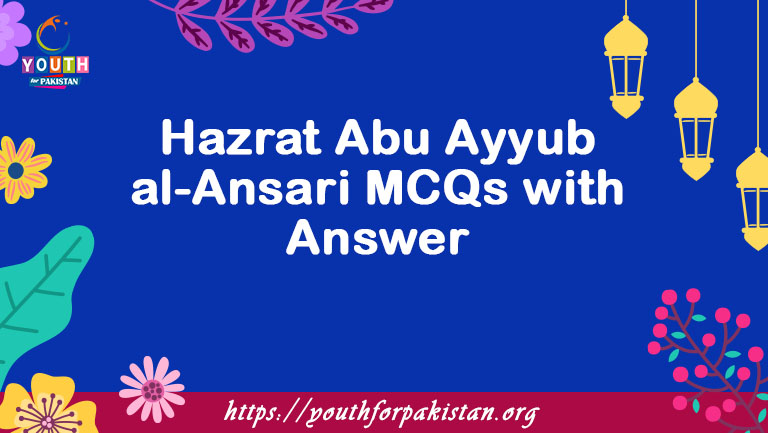The following are Hazrat Abu Ayyub al-Ansari MCQs with answers related to Islamic Studies. We have arranged the most important and repeated MCQs in all the competitive examinations. The students can clear their concepts for Hazrat Abu Ayyub al-Ansari MCQs online quiz by attempting these.
Hazrat Abu Ayyub al-Ansari Online MCQs with Answers
What is the full name of Hazrat Abu Ayyub al-Ansari?
a) Abu Ayyub ibn Abi Isma’il
b) Abu Ayyub Abdullah ibn Amr ibn Jabir al-Ansari
c) Abu Ayyub al-Ansari ibn Malik ibn Qais
d) Abu Ayyub al-Ansari al-Madani
Hazrat Abu Ayyub al-Ansari was a prominent companion of:
a) Prophet Ibrahim (peace be upon him)
b) Prophet Moses (peace be upon him)
c) Prophet Muhammad (peace be upon him)
d) Prophet Isa (peace be upon him)
In which city did Hazrat Abu Ayyub al-Ansari host the Prophet Muhammad (peace be upon him) when he migrated there?
a) Madinah
b) Makkah
c) Cairo
d) Jerusalem
What was Hazrat Abu Ayyub al-Ansari’s profession before embracing Islam?
a) Merchant
b) Farmer
c) Blacksmith
d) Scholar
Hazrat Abu Ayyub al-Ansari participated in which major battle alongside the Prophet Muhammad (peace be upon him)?
a) Battle of Uhud
b) Battle of Badr
c) Battle of Khandaq (Trench)
d) Battle of Tabuk
After the migration to Madinah, Hazrat Abu Ayyub al-Ansari became the Prophet Muhammad’s (peace be upon him) neighbor in the city. Where did he house the Prophet?
a) In his own house
b) In a separate mosque
c) In a nearby cave
d) In a tent outside the city
Hazrat Abu Ayyub al-Ansari is often referred to as:
a) “The Father of Patience”
b) “The Father of Generosity”
c) “The Father of Hospitality”
d) “The Father of Knowledge”
What role did Hazrat Abu Ayyub al-Ansari play during the Battle of Uhud?
a) He served as the chief commander of the Muslim army.
b) He provided medical assistance to the wounded.
c) He acted as a messenger between the Prophet and his companions.
d) He did not participate in the battle.
Hazrat Abu Ayyub al-Ansari’s unwavering support for the Prophet Muhammad (peace be upon him) continued until his last breath. Where did he pass away?
a) Makkah
b) Madinah
c) Constantinople (Istanbul)
d) Cairo
What is the significance of Hazrat Abu Ayyub al-Ansari’s burial place in Constantinople (Istanbul)?
a) It is a major pilgrimage site for Muslims.
b) It is the location of an important mosque.
c) It is a historical landmark in the city.
d) It marks the first mosque built in the city.
Hazrat Abu Ayyub al-Ansari’s role as the host of the Prophet Muhammad (peace be upon him) during the migration is a testament to his:
a) Wealth and social status
b) Strong familial ties
c) Exceptional hospitality and generosity
d) Close blood relationship with the Prophet
What is the Arabic term for a companion of the Prophet Muhammad (peace be upon him)?
a) Sahaba
b) Ummah
c) Tabi’un
d) Muhajirun
What role did Hazrat Abu Ayyub al-Ansari play during the early years of Islam in Madinah?
a) He served as the city’s mayor.
b) He was the chief judge of Madinah.
c) He was one of the first to accept Islam in the city.
d) He was a prominent merchant.
Hazrat Abu Ayyub al-Ansari’s unwavering support for the Prophet Muhammad (peace be upon him) continued even during times of:
a) Wealth and prosperity
b) Political power and authority
c) Adversity and hardship
d) Religious conflicts and disputes
What was the primary occupation of Hazrat Abu Ayyub al-Ansari before he became a companion of the Prophet Muhammad (peace be upon him)?
a) Farmer
b) Blacksmith
c) Merchant
d) Teacher
Hazrat Abu Ayyub al-Ansari’s role as a host to the Prophet Muhammad (peace be upon him) during the migration exemplifies the importance of:
a) Brotherhood and unity in Islam
b) Military leadership and strategy
c) Economic prosperity and trade
d) Religious scholarship and teaching
Which city did Hazrat Abu Ayyub al-Ansari serve as a governor during the early Islamic expansion?
a) Makkah
b) Madinah
c) Damascus
d) Cairo
Hazrat Abu Ayyub al-Ansari’s loyalty and devotion to the Prophet Muhammad (peace be upon him) earned him a special place in the hearts of Muslims and the title of:
a) “The Righteous Warrior”
b) “The Faithful Companion”
c) “The Keeper of Secrets”
d) “The Guardian of the Ummah”
Hazrat Abu Ayyub al-Ansari was among the early converts to Islam in:
a) Makkah
b) Madinah
c) Taif
d) Cairo
What was the most distinguishing characteristic of Hazrat Abu Ayyub al-Ansari’s relationship with the Prophet Muhammad (peace be upon him)?
a) His exceptional knowledge of Islamic jurisprudence
b) His role as the Prophet’s personal physician
c) His unwavering support and friendship
d) His military leadership in major battles
In addition to hosting the Prophet Muhammad (peace be upon him) during the migration, what other significant role did Hazrat Abu Ayyub al-Ansari play during that time?
a) He acted as the Prophet’s personal bodyguard.
b) He provided military intelligence to the Prophet.
c) He distributed food and supplies to the Muslims.
d) He conducted negotiations with the people of Madinah.
What was Hazrat Abu Ayyub al-Ansari’s stance on the issue of leadership (Caliphate) after the passing of the Prophet Muhammad (peace be upon him)?
a) He supported the Umayyads.
b) He supported the Abbasids.
c) He remained neutral.
d) He claimed the caliphate for himself.
Hazrat Abu Ayyub al-Ansari’s role as a governor in Damascus was characterized by:
a) A strict and oppressive rule
b) A just and benevolent leadership
c) Frequent military campaigns
d) Religious persecution
What was the age of Hazrat Abu Ayyub al-Ansari when he passed away in Constantinople (Istanbul)?
a) 70
b) 80
c) 90
d) 100
Hazrat Abu Ayyub al-Ansari’s legacy is closely tied to his:
a) Military accomplishments
b) Wealth and prosperity
c) Role as a poet
d) Exceptional hospitality and service to the Prophet
What was the original name of the city of Constantinople (Istanbul) when Hazrat Abu Ayyub al-Ansari passed away there?
a) Byzantium
b) Alexandria
c) Antioch
d) Rome
In which Islamic era did Hazrat Abu Ayyub al-Ansari pass away?
a) 1st century AH
b) 2nd century AH
c) 3rd century AH
d) 4th century AH
Hazrat Abu Ayyub al-Ansari’s generosity and willingness to share his resources with the Prophet Muhammad (peace be upon him) and the early Muslims is a reflection of his:
a) Desire for political power
b) Commitment to economic prosperity
c) Deep faith and selflessness
d) Ambition for worldly success
What was the primary source of Hazrat Abu Ayyub al-Ansari’s wealth?
a) Inheritance
b) Trade and commerce
c) Agriculture
d) Military conquests
Hazrat Abu Ayyub al-Ansari’s journey from Madinah to Constantinople (Istanbul) to participate in the conquest of the city reflects his commitment to:
a) Economic prosperity
b) Religious pilgrimage
c) Jihad and the spread of Islam
d) Diplomatic negotiations
What role did Hazrat Abu Ayyub al-Ansari play during the Battle of Khandaq (Trench), a significant event in early Islamic history?
a) He served as the chief strategist.
b) He was responsible for digging the trench.
c) He provided food and supplies to the Muslims.
d) He did not participate in the battle.
Hazrat Abu Ayyub al-Ansari’s journey from Madinah to Constantinople (Istanbul) is a symbol of his dedication to:
a) Economic prosperity
b) Religious knowledge
c) The spread of Islam
d) Worldly ambitions
What title is often given to Hazrat Abu Ayyub al-Ansari to honor his role as the host of the Prophet Muhammad (peace be upon him)?
a) Al-Qasim (The Distributor)
b) Al-Mujahid (The Warrior)
c) Al-Mukhlis (The Sincere)
d) Al-Khalil (The Beloved)
In which Islamic city did Hazrat Abu Ayyub al-Ansari spend the later years of his life?
a) Makkah
b) Madinah
c) Constantinople (Istanbul)
d) Cairo
Hazrat Abu Ayyub al-Ansari’s loyalty to the Prophet Muhammad (peace be upon him) is exemplified by his willingness to:
a) Sacrifice his wealth for the cause of Islam
b) Lead military campaigns in the Prophet’s name
c) Travel long distances for the sake of the Prophet
d) Challenge the Prophet’s decisions when necessary
What was Hazrat Abu Ayyub al-Ansari’s stance on the issue of leadership (Caliphate) after the passing of the Prophet Muhammad (peace be upon him)?
a) He supported the Umayyads.
b) He supported the Abbasids.
c) He remained neutral.
d) He claimed the caliphate for himself.
Hazrat Abu Ayyub al-Ansari’s role in the Battle of Badr, one of the most significant battles in Islam, demonstrated his:
a) Exceptional military leadership
b) Role as a chief strategist
c) Unwavering faith and courage
d) Absence from the battlefield
What was the primary reason for Hazrat Abu Ayyub al-Ansari’s journey to Constantinople (Istanbul)?
a) To seek business opportunities
b) To participate in a religious pilgrimage
c) To engage in diplomatic negotiations
d) To support the Muslim army in its conquest
Hazrat Abu Ayyub al-Ansari’s unwavering support for the Prophet Muhammad (peace be upon him) is a reflection of his:
a) Desire for political power
b) Commitment to economic prosperity
c) Deep faith and selflessness
d) Ambition for worldly success
What is the Arabic term for the migration of the Prophet Muhammad (peace be upon him) from Makkah to Madinah?
a) Hajj
b) Hijrah
c) Jihad
d) Shahada
Hazrat Abu Ayyub al-Ansari’s exceptional hospitality towards the Prophet Muhammad (peace be upon him) during the migration highlights the importance of:
a) Brotherhood and unity in Islam
b) Military leadership and strategy
c) Economic prosperity and trade
d) Religious scholarship and teaching
What was Hazrat Abu Ayyub al-Ansari’s role in the Battle of Khandaq (Trench)?
a) He served as the chief commander of the Muslim army.
b) He was responsible for digging the trench.
c) He acted as a messenger between the Prophet and his companions.
d) He did not participate in the battle.
In which city did Hazrat Abu Ayyub al-Ansari host the Prophet Muhammad (peace be upon him) during the migration?
a) Makkah
b) Madinah
c) Cairo
d) Jerusalem
Hazrat Abu Ayyub al-Ansari’s role as the host of the Prophet Muhammad (peace be upon him) during the migration is a symbol of his:
a) Desire for political power
b) Commitment to economic prosperity
c) Deep faith and selflessness
d) Ambition for worldly success
What is the Arabic term for the companions of the Prophet Muhammad (peace be upon him) who participated in the Battle of Badr?
a) Muhajirun
b) Ansar
c) Sahaba
d) Tabi’un
Hazrat Abu Ayyub al-Ansari’s role in hosting the Prophet Muhammad (peace be upon him) during the migration reflects the spirit of:
a) Compassion and charity
b) Military conquest and expansion
c) Diplomatic negotiations
d) Brotherhood and solidarity
What was the outcome of Hazrat Abu Ayyub al-Ansari’s journey to Constantinople (Istanbul) to support the Muslim army?
a) The conquest of the city
b) A peaceful resolution with the Byzantines
c) His return to Madinah
d) His conversion to Christianity
Hazrat Abu Ayyub al-Ansari’s exceptional hospitality during the migration emphasized the importance of:
a) Military strategy and leadership
b) Economic prosperity and trade
c) Brotherhood and solidarity
d) Political power and authority
What was Hazrat Abu Ayyub al-Ansari’s age when he became a companion of the Prophet Muhammad (peace be upon him)?
a) In his teens
b) In his twenties
c) In his thirties
d) In his forties
Hazrat Abu Ayyub al-Ansari’s steadfast support for the Prophet Muhammad (peace be upon him) and the early Muslim community serves as a model of:
a) Religious scholarship
b) Political leadership
c) Exceptional hospitality
d) Economic prosperity










